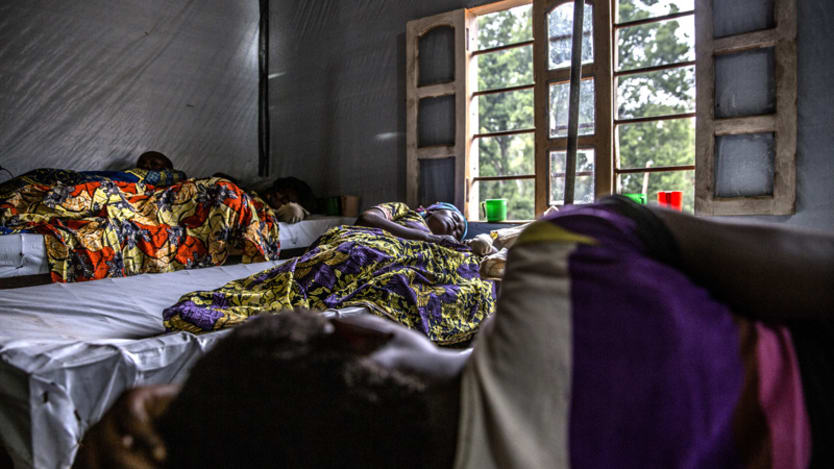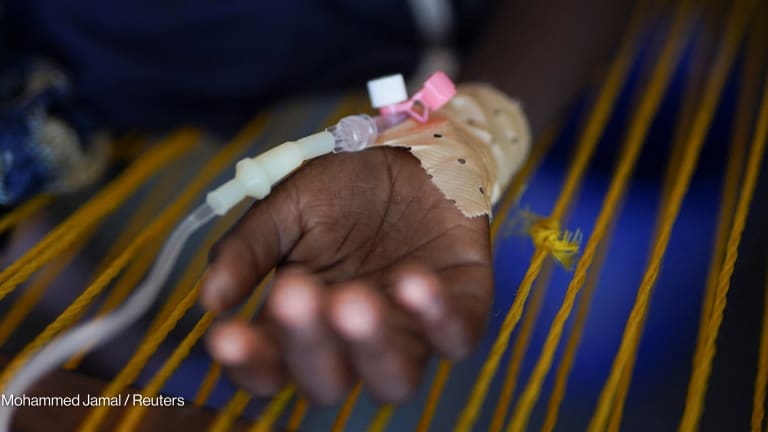
WASHINGTON — Torrential downpours and subsequent mudslides in the crowded capital of the Democratic Republic of the Congo, Kinshasa, earlier this week are expected to worsen the cholera outbreak that has held the country in its grasp since January 2017.
The national health emergency — which, to date, has caused more than 1,000 deaths among the 53,000 confirmed cases — is the country’s worst cholera outbreak in more than two decades. Some 21 of the country’s 26 provinces are affected, and since October 2017, cases have appeared in typically unaffected regions such as the southwest region of Kasai province. There, 3.5 million lack water, sanitation, and many have been displaced by local conflict.
DRC peacekeeping forces prepare for a worsening 2018, UN's Lacroix says
New, specially trained battalions will be deployed to the Democratic Republic of the Congo, which continues to face a fragile humanitarian and political situation, United Nations Under-Secretary-General Jean-Pierre Lacroix reported to the Security Council on Tuesday.
“Cholera is always linked to lack of hygiene, lack of sanitation, lack of clean water, and when there is a rainy season adding to those situations, you have the needed mix for the explosion of cholera,” Dr. Fatoumata Nafo-Traoré, Africa regional director for the International Federation of Red Cross and Red Crescent Societies, told Devex. “These together with a lack of health facilities pose a huge threat to the people.”
The onset and spread of this water-borne illness further complicates what the Assessment Capacities Project labeled as a “deteriorating” humanitarian crisis in the country for 2018.
Tensions began rising two years ago when President Joseph Kabila refused to step down at the end of his term. That led to clashes between local militias and national government forces. Since then, intercommunal fighting has persisted in the country’s Southwest Kasai region, North and South Kivu and eastern Tanganyika.
An estimated 1.7 million people fled their homes in DRC last year. Ongoing violence has not only blocked the limited humanitarian aid available, but is also faulted for dismantling the already fragile health, education and agricultural systems. In Kasai province, where 1.4 million people were internally displaced in 2017, more than half of the health facilities have been destroyed, looted, and medical supplies stolen.

Traoré explained how a combination of factors have made DRC “the most challenging situation in the world today.”
“If you recall last year, there was a big cholera outbreak, measles outbreak, yellow fever [and] malaria outbreak,” she explained. “But if you look at the decades of political and economic instability, all those things added with the population influx lead to people fleeing the more insecure areas to areas where sanitation is already an issue, so those internally displaced people are also an additional threat because they don’t have housing or other facilities.”
See more related topics:
► Funding shortfalls stunt humanitarian response in DRC
► World Food Programme DRC lead calls for urgent donor conference
► Death of 14 UN peacekeepers in DRC reveals worsening crisis
► Experts pressure Congress to take action on DRC to stop violence, hold elections
The former Mali Minister of Health suggested a government-led multisectoral approach that focuses on increasing local awareness, improving access to water and sanitation, and providing health services for youth as the first steps needed to turning around the outbreak. However, she said, the dire needs of the country are not being met with the level of response necessary to have a substantial impact.
Even more worrying is the fact that DRC shares borders with nine countries, including places such as South Sudan, Burundi, and Uganda who have seen heightened numbers of displacees entering and leaving these countries due to conflicts in surrounding areas.
Another neighbor, Zambia, announced earlier this week that it has postponed the start of the school year to due a cholera outbreak there that has killed 61 people and sickened thousands others. Street vending has been banned, along with public gatherings, and the army has been patrolling the streets to ensure compliance with the tightened restrictions. No date has been set for students to return, but prior to reopening, Zambian Health Minister Chitalu Chilufya said a vaccination programme will be rolled out and the ministry will sensitize communities about improving children’s personal hygiene.
Though potentially linked, officials have yet to confirm whether this outbreak originated in DRC.
Médecins Sans Frontières, along with the DRC Ministry of Health, is preparing to open the doors to the country’s first cholera treatment center at Camp Luka later this week, the neighborhood considered the epicenter of the current DRC outbreak. IFRC has also mobilized 200,000 swiss francs ($206,180) to support the DRC Red Cross Society to reach 244,000 people in need. However, Traoré argued that these efforts aren’t nearly sufficient.
“The actual need is in the millions so it requires more resources, more people to make themselves available in affected areas where health facilities are closed, more volunteers are needed, but many more people are required to support the health workers because there just aren’t enough,” she asserted.
Read more Devex coverage on the Democratic Republic of Congo.




